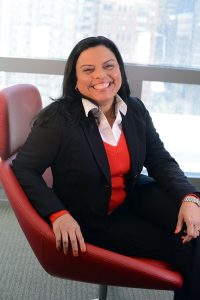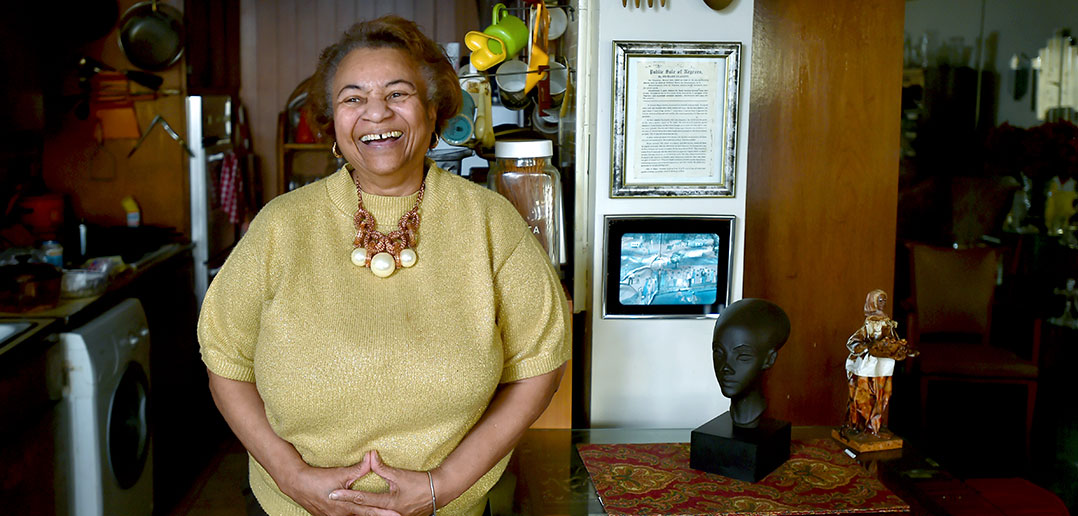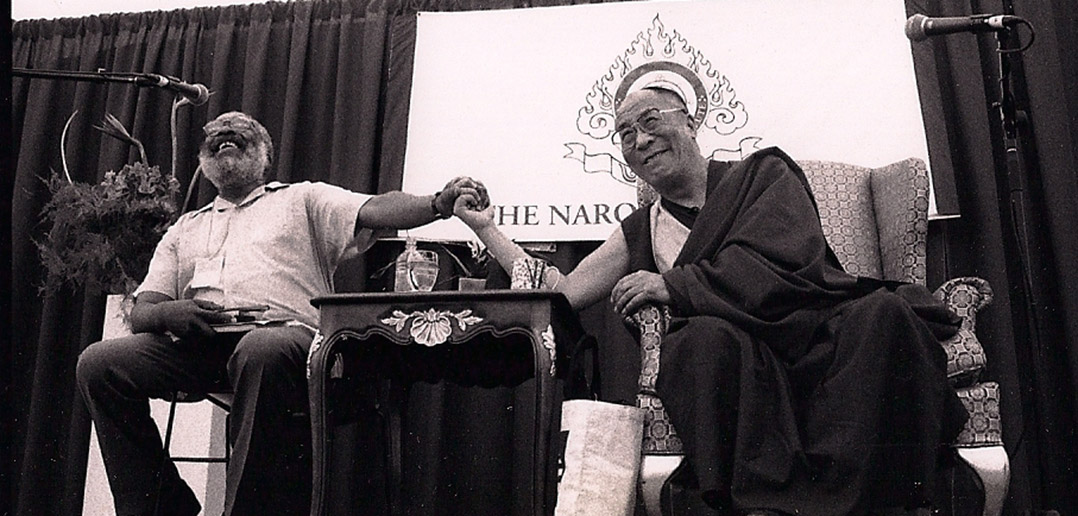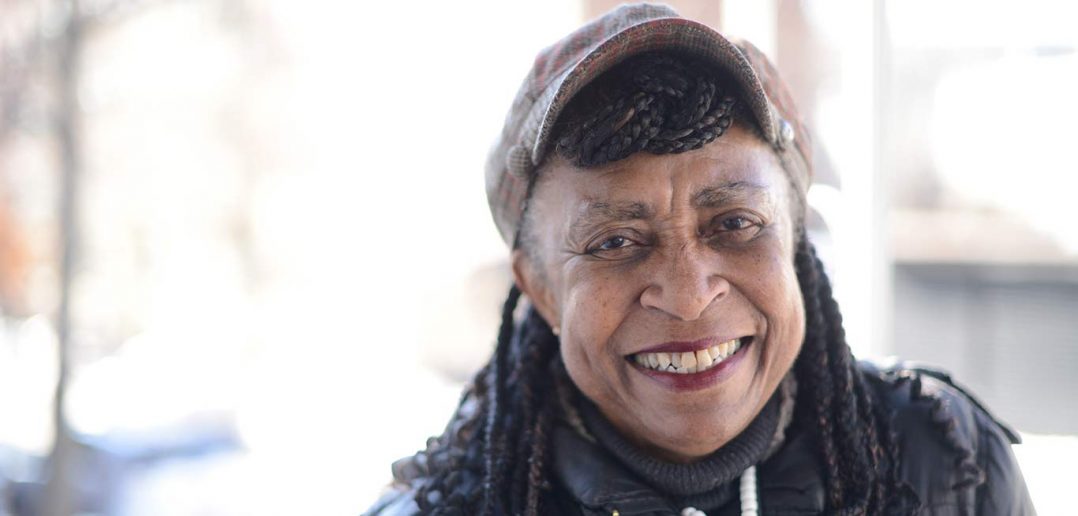Next week at Fordham, a forum will plunge into the thorny casting issues that arise in theater.
On May 2, the theatre program co-sponsors Beyond Orientalism: The Forum, at 7 p.m. in the Pope Auditorium. The forum, which will feature two panel discussions and a breakout session, is co-sponsored by the Asian American Arts Alliance, Asian American Performers Action Coalition (AAPAC), Theatre Communications Group, and Alliance for Inclusion for the Arts.
The University hosted a similar forum with AAPAC four years ago, when the group released a study indicating that Asian Americans received only 3 percent of all available roles in the nonprofit sector, and only 1.5 percent of all available roles on Broadway in the past five years.
Matthew Maguire, director of the Fordham theatre program, said the situation hasn’t improved much since then, as evidenced by a series of yellowface/brownface theater productions around the country last year.
“This just infuriates Asian Americans,” he said. “If you’re in a commercial situation, you should never take a job away from someone who has fewer opportunities than you do to get that job. That white people are taking jobs that ought to go to Asian actors is just wrong.”
He said that Asian actors are often still viewed as foreigners. He recalled that one actresses attending the 2012 forum said it was common for people to compliment her on how well she spoke English—not realizing she was born and raised in the United States.
The timing for the forum is fitting, he said, given that this year’s Mainstage Season, “A Season from the Mountaintop,” was about inclusion, and featured an Asian classic, The Orphan of Zhao, directed by Ralph Peña, a native of the Philippines.
The difficulties with that production illustrated the challenges that lie ahead, Maguire said.
“We cast all the Asian actors we have, and the other roles were played by white actors,” said Maguire. “But they weren’t playing yellowface, meaning they weren’t trying to appear Asian—they weren’t changing their eyes, wearing black wigs, or speaking with an accent. We treated it like a classic in the same way that we would treat Shakespeare, giving work to our Asian actors but also giving other actors the chance to explore another culture.”
“I thought this was a wonderful thing, but there were some Asian students who were upset. A few, in fact, were quite upset.”
This debate about what constitutes proper casting is not limited to Fordham. Last year, the playwright Lloyd Suh insisted that a Pittsburgh college halt production of his play Jesus in India because of the cast’s ethnic composition, said Maguire.
Maguire said he disagreed with the decision to limit that production, saying that if you want to spread the word about the Asian-American experience and Asian-American writing, you should expose it to as many people as you can. He joked that in tackling this topic at the forum, the organizers are deliberately “opening up a Pandora’s Box.”
“The productive side of this is, now all the demons are rushing out and we get to look them in the eye and see if we can find common ground,” he said.
For more information rsvp at [email protected].
]]>
A Prison Lieutenant’s Quiet Activism
Beatrice Bergland’s childhood memories of the Bronx are bittersweet. She remembers walking down 170th Street with her grandfather and collecting food samples from the storekeepers. She also remembers the years of being chased home from school by the white children, and the day her grandfather’s life was brutally ended, perhaps for no other reason than having been black…
Bronx Diversity Molds a Civil Rights Champion
Vincent Harding was proud to be from New York, and as he got older he looked back fondly on his years at a richly diverse high school in the Bronx. “He had classmates from Eastern Europe, from Italy, from Ireland, from parts of Asia—just lots of different places in the world,” said his daughter, Rachel Harding, PhD. The experience “gave him a grounding and commitment” to seeing a true multicultural democracy take hold in America, she said…
Hetty Fox, Portrait of a Tireless Activist
The block-long, slightly sloping one-way street in Foxhurst in the Bronx is technically known as Lyman Place.
But come summertime, it may as well be known as “Play Street Boulevard,” or, perhaps, “Hetty Fox Lane.” That’s because Fox, whose family moved to the neighborhood in 1940 when she was 3 years old has been a near-constant presence in the neighborhood. She has also been a driving force behind a 40-year tradition of periodically closing the street to traffic and opening it up for children to play…
Morgan Powell, the Late Historian Continues to Inspire
From boat clubs on the Hudson to the living rooms of the Grand Concourse to environmental justice meetings in Brooklyn, New Yorkers still talk about the research and activism of the late Morgan Powell, the self-trained historian who combined environmental justice with black history…
]]>The University’s Offices of Career Services and Multicultural Affairs have teamed up to sponsor a contest that encourages students to reflect upon positive outcomes of inclusion in the workplace, and how they themselves might help alter the world of work.
The contest, “Diversity Leadership in a Global Society,” is open to Fordham undergraduates and students enrolled at the Graduate School of Arts & Sciences and the Graduate School of Education. It is part of a semester of programming dedicated to advancing diversity.
$5,000 in prize money will be awarded to 15 contestants who submit an entry in one of three categories: Audio/Video (i.e.: webisodes, interviews, dance), Visual Arts and Multimedia, (i.e.: photography, podcasts, video narratives), and Written (i.e.: poetry, screenplays, or essays).
Stefany Fattor, director of Career Services, said a similar contest held last year drew a good turnout. But this year she hopes the expanded categories will encourage greater turnout—including more students from the Lincoln Center campus.
The contest deadline is March 16. The entries will be judged by faculty, administrators, and alumni, as well as representatives from organizations that recruit at Fordham. The winners will be announced at a banquet on April 6. The contest is open to both individuals and teams.
The challenge for students will be to not only articulate things such how their personal history affects their views of diversity, inclusion and social justice, but to also present ideas for promoting practices and models for diversity, inclusion and social justice in the world of work, said Fattor. Students need this more than ever to succeed in today’s job market.
“In the economy that the students are entering today, they’re going to basically be paid to think for a living,” she said. “Personal awareness is tremendously important to navigate that, because it’s so collaborative.”
Guidelines for the contest can be found here.
]]>Surrounded by students, alumni, and staff, Father McShane said, “It’s only when you break out of your own comfortable home, neighborhood, way of seeing things, that you’re stretched and that you grow and become leaders. To settle into what is familiar creates within us laziness of heart as well as mind.”
Father McShane’s remarks kicked off “Diversity Leadership in a Global Society,” a conference that addressed the theme of a weeklong campus-wide reflection on race relations in America. The event was organized by the Offices of Career Services (OCS) and Multicultural Affairs, and sponsored by Johnson & Johnson.
In a series of workshops and lectures, including a keynote address by Claude Mangum, PhD, professor emeritus of African and African-American studies, students were encouraged to embrace their differences in order to enhance their professional growth. The sooner they have the tools necessary to understand and embrace diversity, the easier it will be to apply to the workforce, said Maria Aponte, GSAS ’14, diversity initiatives coordinator for OCS.
Johnson & Johnson Chief Diversity Officer Anthony Carter, FCRH ’76, stressed the importance of diversity in the workforce.
“I’ve really gotten grounded in what that role means in terms of mission, vision, and purpose,” he said. “[It] collectively brings us all into a space where we have to share our differences and similarities in order to see our greatness.”
Determined to give back to the school that gave so much to him, Carter helped secure a $25,000 gift from the company to sponsor the conference and fuel Fordham’s mission of embracing diversity.
In the midst of growing racial tensions in the United States, this conference and week of reflection came at a perfect time, students said.
“One of the things a Jesuit university teaches us is to be mindful of changes in society and issues that effect everyone,” said Fordham College at Rose Hill senior Princess Chukwuneke.
“This week gets the whole university to reflect on the things that are really important.”
]]>Now imagine that you are 9 years old and you need to start school in this new country. You’ve always loved learning, but you quickly realize that now you can’t even follow what the teacher is saying or ask a classmate for help. Chances are you won’t excel this school year. You wonder if you’ll ever catch up.
Millions of immigrant students in the United States face this situation—yet, the language difference is just the beginning of the problem, said Diane Rodriguez, PhD.
An associate professor at the Graduate School of Education and a longtime bilingual education instructor, Rodriguez tells her graduate students that much more than learning English is needed to help immigrant children thrive in the American education system. These students need a comprehensive and individualized educational plan to help them acclimate to their new learning environment, as well as to their new home’s culture.
“For students to thrive academically, it’s not only about language, but also about culture,” said Rodriguez, who is a Fordham alumna. “It’s about understanding who these children are and the community they come from, why they are here, and what they expect of—and hope for—in their education.”
Biography-driven instruction: learning who our students are

Rodriguez advocates for an approach that combines biography-driven instruction with use of children’s native language, which she says is critical for cognitive and emotional growth. She offers a native language instructional model in her recent co-authored book, The Bilingual Advantage: Promoting Academic Development, Biliteracy, and Native Language in the Classroom (Teachers College Press, 2014).
To a teacher who is not versed in this model, non English-speaking students may appear to be fundamentally limited in English proficiency. Rodriguez, however, considers these students to be “language enriched pupils” who are able to draw on their native language while learning English and content knowledge. When teachers utilize the strengths that these students have already acquired through this enriched sociocultural and linguistic background, the students do better.
To access these strengths, though, teachers must first identify them. Many bilingual education teachers are already employing biography-driven instruction, Rodriguez said, For instance, she knows teachers who create biography cards for each student that list useful tidbits such as family information, first and second language proficiency, reading and writing levels in both languages, and cognitive abilities.
This is a good start, she said. But if teachers are to truly empower their culturally and linguistically diverse students, there is more important information yet to capture.
“We need to identify students’ individual learning styles—what motivates them, what makes them laugh,” she said. “It’s about embracing all of the cultural knowledge and awareness that they bring into the classroom.
“When you get to know your students, you’re able to develop and modify instruction for your group of students,” she continued. “It takes time—you have to put an effort in as an educator to get to know your audience.”
The intersection of bilingual education and special education
In addition to making bilingual instruction more effective, Rodriguez studies the impact that cultural and linguistic diversity have on special education. Her interest in this area began while she was teaching special education in New York City. She noticed that a number of her immigrant students had been diagnosed with learning disabilities when, in fact, they were merely struggling to learn English.
Over time, she realized that many teachers were in need of more nuanced training when it came to the intersection of bilingual education and special education.
To that end, Rodriguez recently directed the Bilingual Special Education Summer Institute at Fordham to provide additional training to educators involved in both special education instruction and bilingual services—a dual service needed by as much as 22 percent of New York City students.
The institute attracted more than 150 participants to Fordham’s Lincoln Center campus. Over the course of a week, the teachers were immersed in the latest research and methodologies for teaching English language learners with special needs, especially in light of the diversity of cultures, languages, abilities, and socioeconomic statuses of these students.
“All of these factors are integrated, and you have to take all of them into consideration when you’re developing an educational plan for a child,” Rodriguez said.
“Nelson Mandela once said that when you speak in a language that someone understands it goes to his head, but when you speak in his native language, it goes into his heart. That’s what happens for many of the children who are acquiring a second language in this country—when you speak to them in their native language [that is, in a way that respects who they are and where they come from]they will always remember.”
Watch an interview with Diane Rodriguez
]]>
Henri Nouwen once contrasted two social mindsets and ways of living as the “taking” form of existence and the “forgiving” form. The taking form, he wrote, is characterized by controlling and dominating others, manipulating, stereotyping and judging—or prejudging—them. The forgiving form, on the other hand, allows for, expects and respects differences. No doubt, forgiving differences can sometimes be more difficult and challenging than forgiving wrongs. Ask any roommate or, better still, ask a married couple. But such an attitude is needed for developing any kind of true personal relationship.
| No doubt, forgiving differences can sometimes be more difficult and challenging than forgiving wrongs. |
Our lives are filled with invitations to “encounter” others. The word itself denotes the challenge of moving into a world that is counter, or contrary, to our own. We meet each other from our different backgrounds created by cultural and environmental diversity—different experiences and different expectations. Listening to and understanding another person requires that we leave behind our own world for the time being in order to enter into the other’s, as if we were the other. Only then can we show others the acceptance and respect that will allow them freely to be and share themselves openly with us. Accepting others does not mean always agreeing with them or approving of what they do.
I learned this lesson from experience, during more than two decades of living in an altogether different culture that I came to respect and value and, indeed, learn from. Unless we are capable of appreciating differences, we shall rarely be able to transcend a self-imposed close-mindedness and isolation—as individuals, as communities and groups, as nations—so as to enter into the world of others in friendship, trust and, yes, even of love. Remember what Ben Franklin said long ago: “Those who love only themselves need not fear having any rivals.”
We are no strangers to diversity and pluralism. As a nation, we were founded on cultural and religious differences and continue to boast of our successful “melting pot” experience of assimilating those differences. But have we in the process lost some of the traditions that shaped the identities of our forbearers and were handed on to us—identities that should enrich and not endanger our unity?
“The same forces of mobility and education and commerce that have brought diverse people together,” writes sociologist Nancy Ammerman, “have also dislodged people from traditional communities in the process.” In order to be politically correct, many of us are generally reticent about sharing our views and beliefs with others, and prefer to settle for a “least common denominator” that somehow, but only vaguely, unites us all. As a result, for example, we may be ready to subscribe at least to a religious “deism” that accepts God’s existence but not necessarily any active presence in our lives or in our history, except for God wanting us all to be “good, nice, and fair to each other.” Does this entitle us to be called a religious nation? Not really, or so it seems to me, when we suppress the rich faith traditions and identities we have here in our midst. “Within Christianity,” Ammerman continues, “ecumenism emphasized common ground and discouraged particularity. The result for many young adults is a growing indifference to those particularities—we’re all the same, aren’t we?”
Once, during a high school retreat in India, a Hindu girl proudly asserted before her classmates that, though she had given up many of her faith traditions, she still believed in God and prayed every day. I then asked her: “But what will you pass on to your children?” Having witnessed a generation or two of a faith tradition becoming “fuzzier and fuzzier,” I wonder if we might not ask ourselves a similar question today?
True, the principles of religious freedom, to which church and state by and large subscribe to in our land, both protect the rights of individuals and groups to practice their own faith without fear of censure, and protect us all from any behavior by others that would openly or subtly coerce us and inhibit our freedom of conscience through aggressive proselytization. But, especially in a university setting, students should be given the opportunity to learn more about their own faith tradition by examining its teachings and values in an academic yet very personal way. At the same time, there should be opportunities to learn from one another and about other faith traditions as well.
Over the years, I have discovered an “attitudinal continuum” that has helped me understand society’s coping with diversity in ways both healthy and unhealthy. Let me first propose the continuum and then briefly explain each stage of that continuum.
Attitudinal Continuum vis-à-vis Diversity
Apathy, Acceptance, Assertiveness, Aggression
Obviously, the extreme behaviors of apathy and aggression have no place in effective, healthy discourse. Apathy, in effect, communicates to the other: “I really don’t care what your views or beliefs are. It just doesn’t matter to me, and I’m not interested in getting involved.” Aggression, on the other hand, seeks to control the response of the other: “You had better subscribe to my views and beliefs for your own good. It’s the only way that we can get along.”
Acceptance implies that we listen to the other with understanding and even appreciation: “Your views seem very interesting to me. I have never really looked at the world in this way. I value your ideas and, by extension, I suppose that means I value you. Though I may see things differently from you, I respect your views and I think I understand the insights and values that ground them.”
Assertiveness (“This is what I believe and this is why. My beliefs and actions are firmly grounded in what I myself have seen and heard, or in what reliable and credible teachers and witnesses, past and present, have handed on to me.”) is probably where we seem most deficient these days, either because we are not well-grounded in the foundations of our own traditional teachings and beliefs, or because we fear that sharing our views and beliefs with others might seem like imposing them on others and therefore lead to alienation and even to possible hostility. But this is where the university community, with its own tradition of free and reasoned discourse, should serve as a laboratory in healthy relationships and effective communication.
E pluribus unum requires that we not just suppress our differences but that we learn to respect and value them, even as we deepen our understanding and appreciation of our own views and beliefs, and our ability to share them openly and freely with others. We might learn much about who we are by appreciating who we are not.



